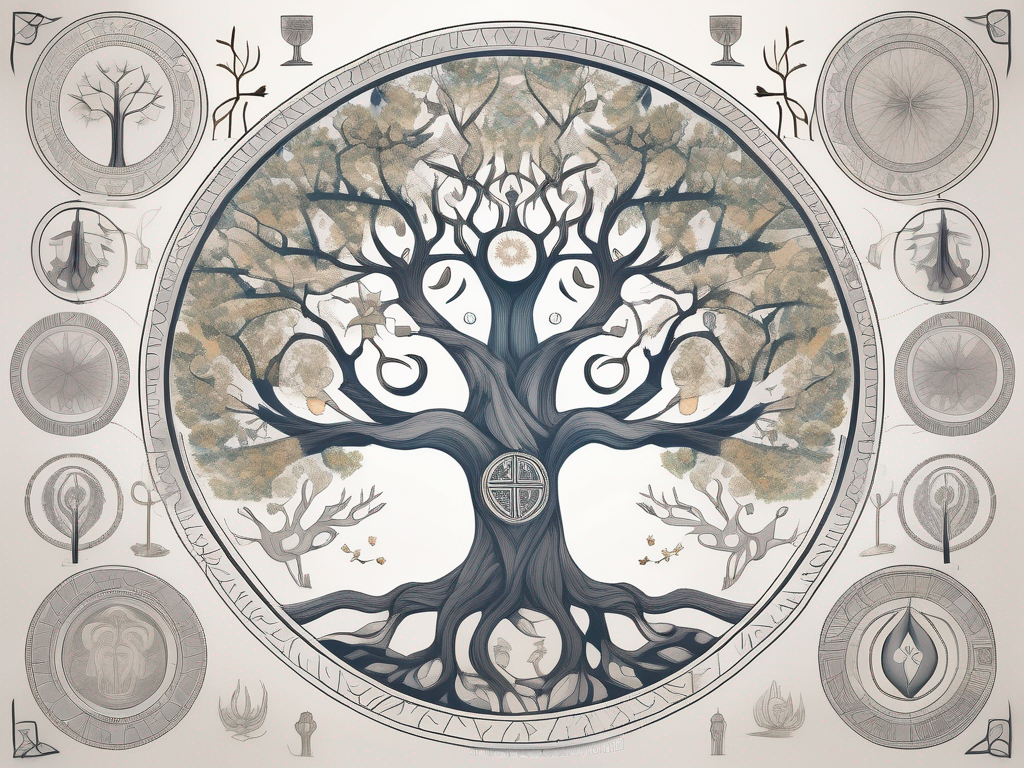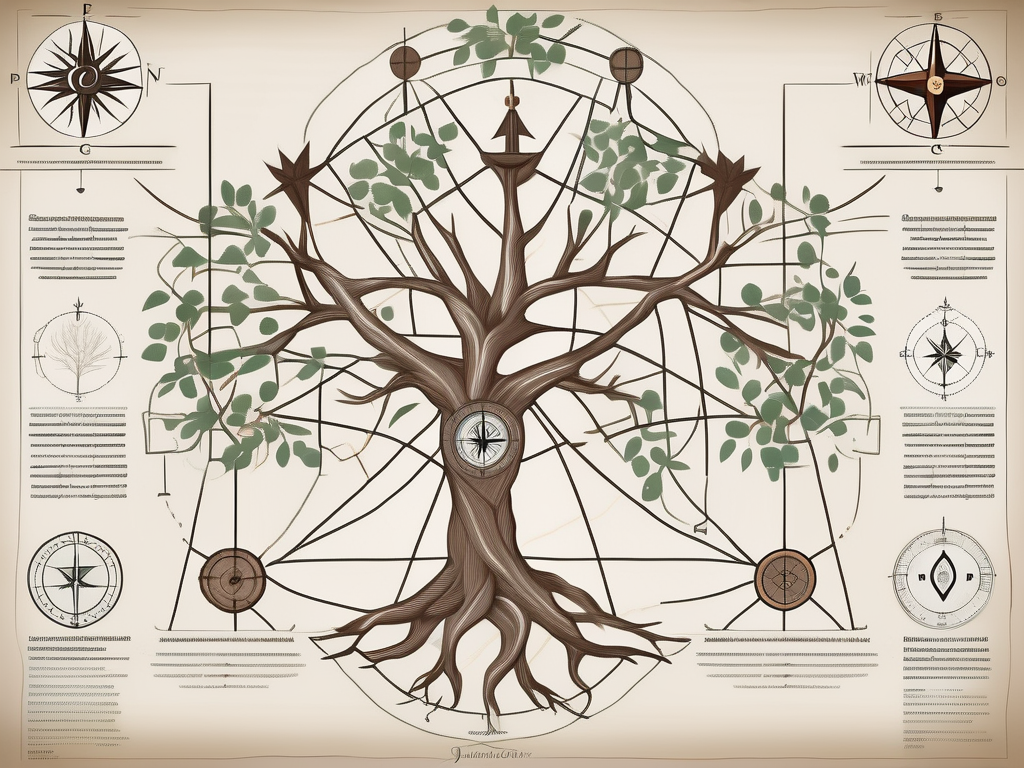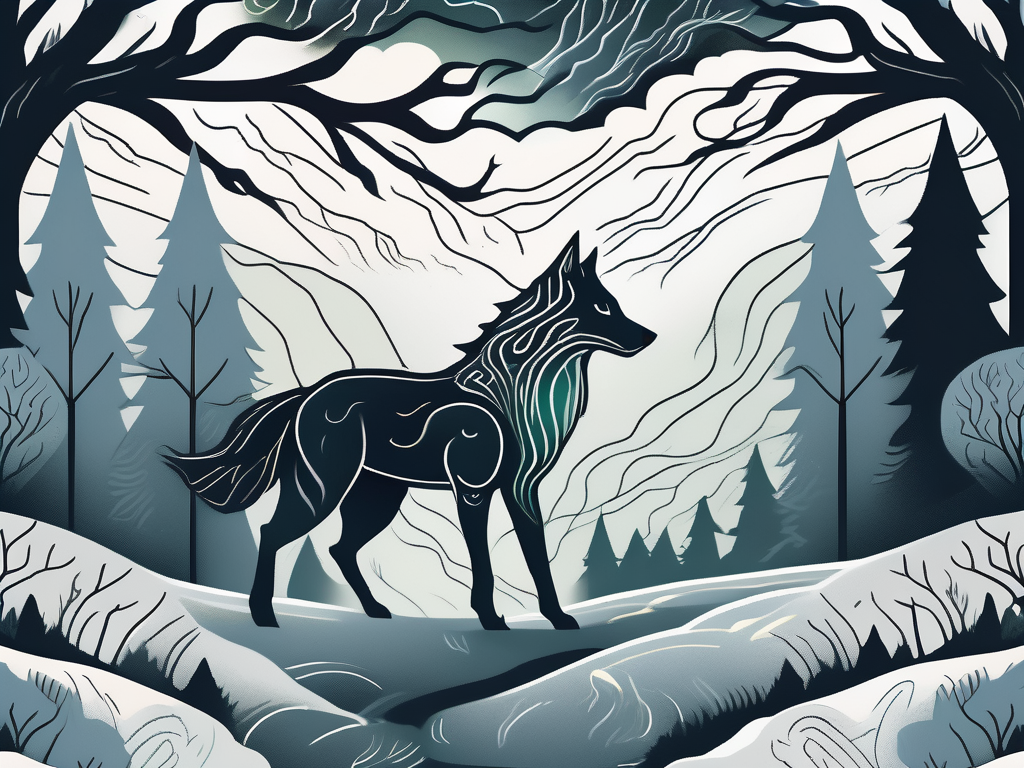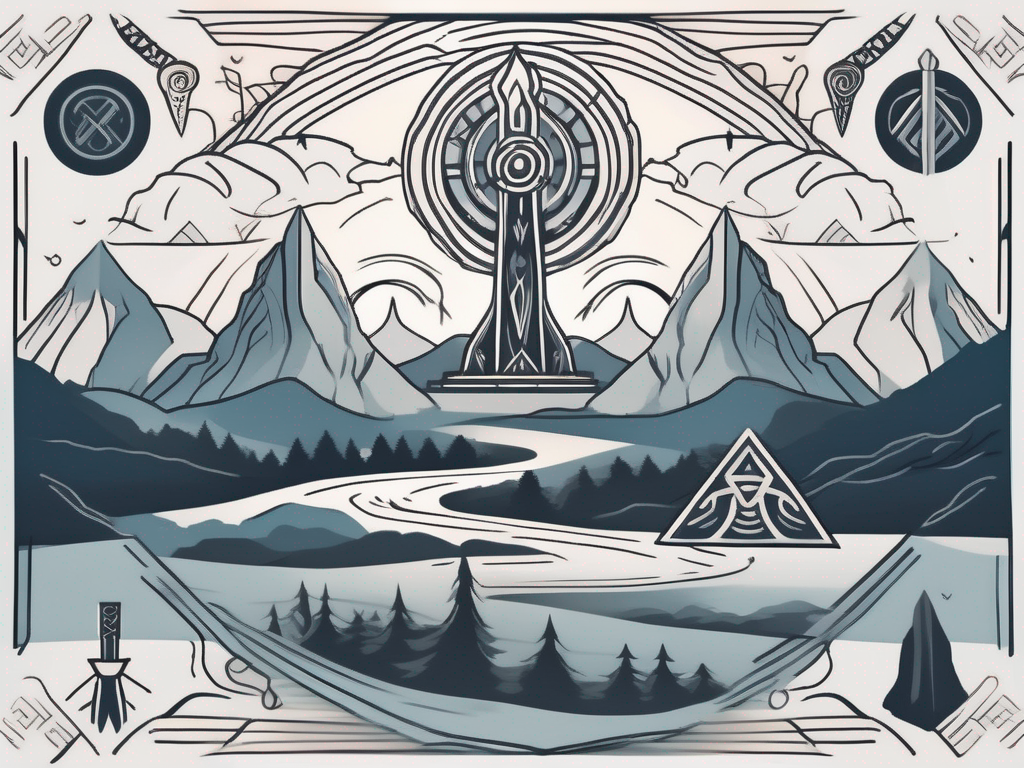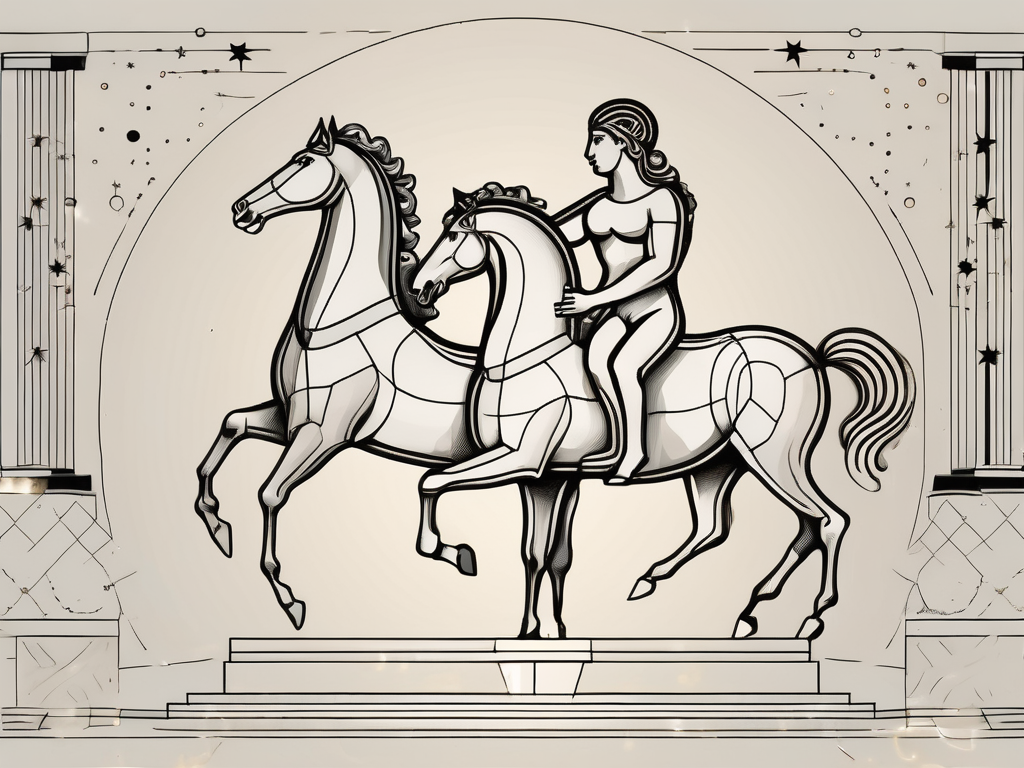Greek mythology is filled with a plethora of fascinating stories and characters. From powerful gods and goddesses to legendary creatures and daring heroes, the tales of ancient Greece continue to captivate audiences to this day. One aspect of Greek mythology that is often overlooked but holds great significance is the concept of divine lineage. Understanding the family tree of the Greek gods is like unraveling a complex puzzle, revealing the intricate interconnectedness of these mythical beings.
Understanding the Concept of Divine Lineage
Divine lineage refers to the genealogy of the gods, tracing their ancestry and relationships with one another. In Greek mythology, the gods are not only powerful beings but also complex individuals with rich family histories. Each deity has a place in the family tree, and their position determines their powers, responsibilities, and allegiances.
At first, it may seem overwhelming to grasp the sheer complexity of the divine lineage. However, by delving into the importance of lineage in Greek mythology and familiarizing ourselves with the structure of the Greek gods family tree, we can begin to unravel the fascinating web of relationships that exists between these mythical beings.
The Importance of Lineage in Greek Mythology
In Greek mythology, lineage plays a crucial role in determining the power and status of each deity. Many gods and goddesses derive their authority and dominion from their parentage or bloodline. For example, Zeus, the king of the gods, owes his position to his father Cronus and his grandfather Uranus. Understanding the lineage of the gods allows us to comprehend the hierarchy and power dynamics within the pantheon.
Furthermore, lineage also explains the familial relationships and interactions between the gods. Rivalries, alliances, and conflicts often arise as a result of blood ties. As we explore the family tree of the Greek gods, we gain insights into the intricate dynamics that shape their stories and influence their actions.
One fascinating aspect of lineage in Greek mythology is the concept of divine inheritance. Just as mortal beings inherit traits and characteristics from their parents, the gods also inherit certain qualities from their divine ancestors. These inherited traits can manifest in various ways, such as physical attributes, personality traits, or even supernatural abilities. For instance, the god Apollo inherited his musical talent from his father Zeus, while Athena inherited her wisdom and strategic prowess from her father Zeus as well.
Moreover, lineage in Greek mythology is not limited to the gods alone. Mortal heroes and demigods also have their place in the divine lineage, often being born from the union between a god and a mortal. These hybrid beings possess a unique blend of mortal and divine qualities, making them exceptional individuals with extraordinary destinies. The most famous example of such a hero is Heracles, the son of Zeus and the mortal woman Alcmene. Heracles’ divine lineage granted him immense strength and courage, enabling him to accomplish incredible feats and become a legendary figure in Greek mythology.
The Structure of the Greek Gods Family Tree
The Greek gods family tree can be divided into three distinct generations: the primordial deities, the Titans, and the Olympians. Each generation holds its own significance and contributes to the overall tapestry of mythology.
The primordial deities are the first beings to emerge from the chaos at the beginning of creation. They embody the fundamental forces of the universe, such as Gaia (the Earth), Uranus (the Sky), and Nyx (the Night). These primordial deities set the stage for the subsequent generations of gods and goddesses, shaping the world and establishing the natural order.
Following the primordial deities are the Titans, who are the children of Gaia and Uranus. They are powerful beings who rule over the cosmos before the rise of the Olympian gods. The Titans include prominent figures such as Cronus, Rhea, Oceanus, and Hyperion. The Titans play a significant role in Greek mythology, often being associated with natural phenomena and cosmic forces.
Finally, the Olympians are the third and most well-known generation of gods. They are the children of the Titans, and their rise to power marks the overthrow of the Titanomachy, a great war between the Titans and the Olympians. The Olympians, led by Zeus, establish their dominion over the cosmos and become the ruling deities of Mount Olympus, the legendary home of the gods. This generation includes gods and goddesses such as Hera, Poseidon, Hades, Athena, Apollo, Artemis, Aphrodite, and many others.
Each generation of the Greek gods family tree represents a different era and contributes to the overall narrative of Greek mythology. The primordial deities set the stage for creation, the Titans embody the forces of nature, and the Olympians govern the world and interact with mortals. Understanding the structure of the family tree allows us to appreciate the complexity and depth of Greek mythology, as well as the interconnectedness of its divine characters.
The Primordial Deities: The First Gods
At the very beginning of creation, there was Chaos. From this primordial void emerged the first gods and goddesses, who personified natural forces and abstract concepts. Chaos itself did not have a physical form but represented the infinite and formless potential from which all things originated.
As Chaos expanded, it gave birth to an array of powerful beings, each with their own unique characteristics and roles in shaping the universe. These primordial deities were the architects of creation, laying the foundation for the world as we know it.
Chaos: The Void from Which Everything Sprung
Chaos, the embodiment of disorder and infinite possibility, is the foundation upon which the entire universe was built. From Chaos, Erebus (Darkness) and Nyx (Night) emerged. Together, they created the diverse and ever-changing cosmos we know today.
Erebus, the personification of darkness, enveloped the universe in his mysterious cloak. His presence brought about the absence of light, allowing for the emergence of the celestial bodies that would later illuminate the cosmos. Nyx, on the other hand, represented the enigmatic realm of night, where dreams and secrets reside.
Gaia and Uranus: The Earth and Sky
From the union of Erebus and Nyx, the primordial gods Gaia (Earth) and Uranus (Sky) were born. Gaia became the nurturing and fertile mother of all living beings, while Uranus personified the vast expanse above us.
Gaia, with her boundless love and nurturing spirit, provided a fertile ground for life to flourish. She molded the landscapes, sculpting mountains, valleys, and oceans with her gentle touch. Gaia’s embrace gave birth to countless creatures, from the tiniest insects to the mightiest beasts.
Uranus, the embodiment of the sky, stretched infinitely above Gaia, creating a protective dome that shielded the Earth from the unknown depths of the cosmos. His celestial presence brought forth the cycles of day and night, as well as the ever-changing seasons that shape the world.
Together, Gaia and Uranus formed a harmonious union, their energies intertwining to create a balanced and interconnected web of life. Their divine influence permeated every aspect of existence, from the smallest blade of grass to the grandest mountain range.
The Titans: The Second Generation of Deities
Following the primordial deities, the next generation of gods and goddesses emerged, known as the Titans. These powerful beings were the children of Gaia and Uranus, and they held dominion over various aspects of the natural world.
Cronus and Rhea: Parents of the Olympians
Among the Titans, Cronus and Rhea held particular significance. Cronus, the youngest of the Titans, usurped his father Uranus, becoming the ruler of the cosmos. With Rhea, his sister and wife, Cronus fathered the next generation of gods: the Olympians.
The Role and Influence of the Titans
While the Titans eventually lost their dominion to the Olympians, they played a crucial role in Greek mythology. Some Titans, such as Atlas and Prometheus, had direct interactions with humans, shaping the fate of mortals. Others represented natural forces, like Oceanus and Hyperion, ruling over the seas and the sun, respectively.
The Olympian Gods: The Rulers of the Cosmos
The Olympian gods are the most well-known and influential deities in Greek mythology. They are the third and final generation of gods, and their lineage can be traced back to the Titans.
Zeus and Hera: King and Queen of the Gods
Zeus, the son of Cronus and Rhea, emerged as the most powerful Olympian. He defeated his father and the other Titans, becoming the king of the gods and the ruler of Mount Olympus. Hera, his sister and wife, held the position of queen, presiding over marriage and childbirth.
The Other Olympians and Their Divine Roles
Aside from Zeus and Hera, the Olympians encompassed a diverse array of gods and goddesses, each with their own domain and responsibilities. Poseidon controlled the seas, Athena represented wisdom and warfare, Aphrodite personified love and beauty, and countless others contributed to the interconnected tapestry of Greek mythology.
Lesser Known Deities and Their Connections
Beyond the primordial deities, Titans, and Olympians, Greek mythology is populated by a multitude of lesser-known gods and goddesses. While their roles may be more specialized or confined to specific domains, they are no less important in the grand narrative of divine lineage.
The Underworld Deities
Hades, the god of the underworld, ruled over the realm of the dead. Alongside him were other underworld deities such as Persephone, the queen of the underworld, and Charon, the ferryman who transported souls across the river Styx.
The Sea Gods and Their Lineage
Poseidon, the brother of Zeus, commanded the vast waters of the world. He was accompanied by a host of sea gods and goddesses, including Triton, his son and messenger, and Amphitrite, his wife and queen of the sea.
The Greek gods family tree is a complex and awe-inspiring web of relationships. From the primordial deities to the Titans and the Olympians, each generation contributes to the rich tapestry of Greek mythology. By understanding the concept of divine lineage and exploring the intricate connections between these mythical beings, we gain a deeper appreciation for the fascinating world of ancient Greek mythology.
